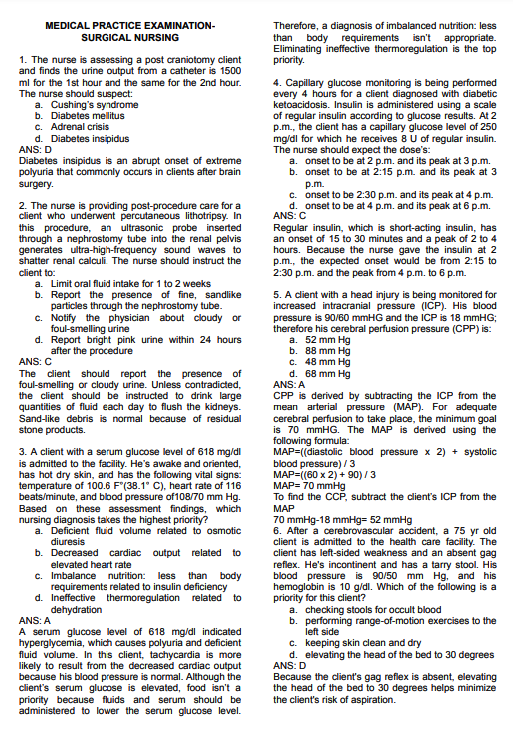Medical Nursing on Surgical Examination
Summary:
A range of clinical scenarios were presented in a medical practice examination focusing on surgical nursing. A post-craniotomy patient with a urine output of 1500ml for two consecutive hours was diagnosed with Diabetes insipidus, common after brain surgery. For a client undergoing percutaneous lithotripsy, the nurse should instruct the client to report foul-smelling or cloudy urine and encourage ample daily fluid intake, as sand-like debris is normal. In a case of a patient with hyperglycemia (serum glucose level of 618 mg/dl), deficient fluid volume related to osmotic diuresis was the priority diagnosis. Capillary glucose monitoring for a patient with diabetic ketoacidosis revealed that regular insulin administered at 2 p.m. would have its onset between 2:15 to 2:30 p.m. and peak between 4 to 6 p.m. A client with increased intracranial pressure had a cerebral perfusion pressure (CPP) of 52 mmHg, calculated by subtracting ICP from the mean arterial pressure (MAP).
Excerpt:
Medical Nursing on Surgical Examination
MEDICAL PRACTICE EXAMINATION SURGICAL NURSING
1. The nurse is assessing a post-craniotomy client and finds the urine output from a catheter is 1500ml for the 1st hour and the same for the 2nd hour. The nurse should suspect:
a. Cushing’s syndrome
b. Diabetes mellitus
c. Adrenal crisis
d. Diabetes insipidus
ANS: D
Diabetes insipidus is an abrupt onset of extreme polyuria commonly occurring in clients after brain surgery.
2. The nurse provides post-procedure care for a client who underwent percutaneous lithotripsy. In this procedure, an ultrasonic probe inserted through a nephrostomy tube into the renal pelvis generates ultra-high-frequency sound waves to shatter renal calculi. The nurse should instruct the client to:
a. Limit oral fluid intake for 1 to 2 weeks
b. Report the presence of fine, sandlike particles through the nephrostomy tube.
c. Notify the physician about cloudy or foul-smelling urine
d. Report bright pink urine within 24 hours after the procedure
ANS: C
The client should report the presence of foul-smelling or cloudy urine. Unless contradicted, the client should be instructed to drink large quantities of fluid each day to flush the kidneys. Sand-like debris is normal because of residual stone products.


Reviews